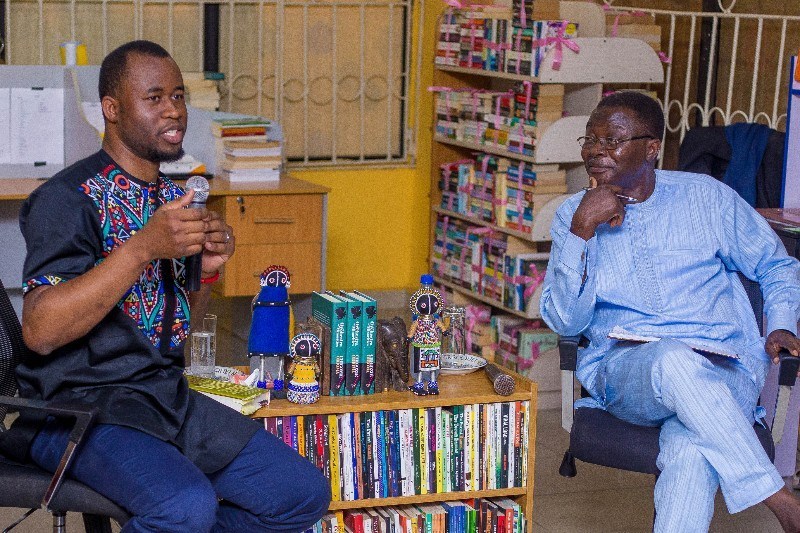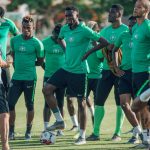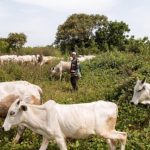
On Sunday, March 24, 2019, P.A.G.E. Book Connoisseurs organised an evening of readings and conversation with Chigozie Obioma, whose second novel, An Orchestra of Minorities, was just published in Nigeria by Parresia. It was a very rewarding encounter with Obioma, who was born in Akure, Ondo State, to an Igbo family of 12 children. He studied English Literature at Cyprus International University (CIU), Northern Cyprus. Because he made a First Class in his set, he was chosen as the student commencement speaker on June 23, 2011. In his speech, Obioma spoke eloquently about the necessity of courage, diligence, hard-work and gratitude. He made a solemn promise to make good use of all he had learnt from CIU. As a story teller, he has been steadily fulfilling that promise. He was 27 years old in 2015 when his first novel, The Fishermen, was shortlisted for the Man Booker Prize. Among other prizes, the novel has won the NAACP Image Award for Outstanding Literary Work, the Los Angeles Times Award for First Fiction and Nebraska Book Award for Fiction. Before then, he was in Ledig House in New York for a residency and at the University of Michigan, Ann Arbor, Michigan, where he completed an MFA in creative writing. He writes occasionally for The Guardian of London, Newstatesman among other publications. Chigozie Obioma is an assistant professor of Literature and Creative Writing at the University of Nebraska-Lincoln, state of Nebraska, USA. In the course of his conversation with KUNLE AJIBADE, Executive Editor/Director of TheNEWS and PM NEWS, the edited transcript of which is published here (including an interview AJIBADE had with him on March 10, 2019 by email), Professor Wole Soyinka, the 1986 Nobel Laureate in Literature, made a video call to the gathering, congratulating the author on his second novel, and his literary achievements so far. Obioma was grateful for Soyinka’s kind words.
Ajibade: Were you strongly drawn to literature very early? You speak Igbo, Yoruba and English fluently. How have these languages expanded your creative imagination?
Obioma: I was born in Akure in 1986 to a family of an Igbo banker who was transferred to the city that same year, with a promotion in the Central Bank. Hence, the name: Chi-Go-Zie, which was intended as a statement on the auspicious circumstances around my birth. I acquired almost all three languages at about the same time, Yoruba becoming more dominant than others for a long time, until our parents forced us to learn Igbo. I think that the languages add certain eccentricities to my diction. There are times when I use a specific tonality or flair that one can only attribute to a particular language other than the English language. But these languages can also be stifling sometimes. I speak Turkish too and when I first learnt it, I recall how difficult it was to communicate extemporaneously in English for a while.
Ajibade: In the acknowledgement page of An Orchestra of Minorities, you thank your unnamed father for being your researcher, copy editor and your champion. Apart from helping you to research the work, how did he help to develop your interest in creative writing and public affairs?
I’m an ontologist — one who is interested in the metaphysics of being. I probe the peripheral, the cosmic questions of life and being, and the result is always that I see a cast of these characters who are unlucky, marginalised, or vulnerable, to use your words. But I won’t say that I linger on this for too long.
Obioma: It is simply because he doesn’t like to take credit for anything and to even be named or thanked. To a great extent, my parents — especially my father — were instrumental in my developing into a writer. First, he helped me cultivate a fecund mind by telling me stories frequently and then he provided the books to help enrich that landscape of my imagination. I wrote for The New York Times last year about how I came to writing, first through the stories they told me and eventually by becoming obsessed with reading.
Ajibade: Benjamin, the narrator of your first novel, The Fishermen, is earthy, while the narrator of your second novel, An Orchestra of Minorities, is an ageless, omnipresent chi, who moves smoothly between our world and the metaphysical realm. I find the innocence of Benjamin and the experience of this elemental chi very striking. Obviously, these are deliberate, strategic artistic choices. Could you explain these choices and how they have helped you to achieve what you set out to do in the two novels?
Obioma: Indeed, they are deliberate. I have often been drawn to alternate ways of story-telling. In The Fishermen, my intention was to have the narrator tell the story by association — that is, to try to understand phenomena by first comparing them with other things; things that he understands more as a child. Thus, to fully comprehend why his father leaves the house frequently to look for food, he has to associate it with the eagle’s trips to hunt for food. For An Orchestra of Minorities, I wanted to look at the questions of fate and destiny through the prism of the Igbo worldview. By having the chi as a narrator — a 700-year-old reincarnating spirit — I was able to chronicle landmarks of Igbo history from the first encounter with the Europeans to the Biafra war. But also, by being loquacious and wastefully confessional, the chi is able to discuss various aspects of the Igbo odinani — from the process of childbirth to the metaphysical plain of the ancestors.
Also, I’m always looking to play with narrative techniques in ways that feel fresh or new to me. To that end, the chi works both as a first and third person throughout the novel. There are times when while within its host, Chinonso, it is speaking in the first person, but when the chi goes into the metaphysical space, it speaks in the third person.
Ajibade: I can see that you intermesh the historical with the fictional in your two novels. You don’t bother to change or invent new names for MKO Abiola, Chief Ralph Uwazurike, Movement for the Actualisation of Sovereign State of Biafra, Oliver de Coque, Mary Onyali, Jay Jay Okocha, Sani Abacha, names of towns, villages and their streets, etc., etc. What effects do you want this naked realism to have on your readers?
Obioma: I have said that I work in the dualism mode — that is, based on the Igbo fundamental axiom that where one thing lies, another thing lies beside it too. In essence, the Igbo believe that there is no distinction between the world of the living and the dead. In the same way, I believe there is not much distinction between the three realms in my fiction: the realm of the real, of the fictional, and of the extraordinary. Hence,the comingling. But there is also the need to situate the realist parts of the novels in specific historical contexts — for The Fishermen, the 1990s Nigeria, and for An Orchestra of Minorities, the 2000s. I think The Fishermen would not have been possible without that specific context, as the encounter with MKO serves as a major turning point in the lives of the Agwu boys.
Ajibade: As you tell your stories, you slot in critical opinions about Nigerian political, cultural and economic problems. How much of topical issues should a novelist accommodate in his or her fiction?
Obioma: I’m not sure how much as I feel it’s the prerogative of individual writers. But I will say that I myself do not set out specifically to tackle political or economic problems in my fiction. When I have such opinions, I put them out as non-fiction. But I believe that when you look straight at a distant hill, if your sight is good enough, you will see other things and not just the hill. This is to say that these questions come through my side vision; they creep into my work because I’m writing about these specific historical moments and the milieu of the characters themselves. Chinonso, having to go to such an underdeveloped country as Cyprus to go to school, is only possible because of the lack of dependable educational possibilities in Nigeria.
Ajibade: What is responsible for your attraction for the stories of the vulnerable, the neglected, and the marginalised, in your novels?
Obioma: Something existential, something indescribable. I’m an ontologist — one who is interested in the metaphysics of being. I probe the peripheral, the cosmic questions of life and being, and the result is always that I see a cast of these characters who are unlucky, marginalised, or vulnerable, to use your words. But I won’t say that I linger on this for too long. The boys in The Fishermen are very different in class status from Chinonso Olisa of An Orchestra of Minorities. They are upper middle class children whose father works for the Central Bank of Nigeria. So, it is only after they encounter the vision-seeing madman that their lives are changed.
“The Fishermen” was, in some ways, based on the experience of growing up in a rather large family by Nigerian standards. The realities of growing up with such a crowd and coming to understand the vicissitudes of siblinghood and the sacredness of consanguinity in the Igbo/Yoruba culture inspired the novel. But so also was nostalgia for childhood days and the Nigeria of that time.
Ajibade: In what ways are parts of The Fishermen and An Orchestra of Minorities recreations of your own life experiences?
Obioma: The Fishermen was, in some ways, based on the experience of growing up in a rather large family by Nigerian standards. The realities of growing up with such a crowd and coming to understand the vicissitudes of siblinghood and the sacredness of consanguinity in the Igbo/Yoruba culture inspired the novel. But so also was nostalgia for childhood days and the Nigeria of that time. Growing up, I was awakened to the campaign of Moshood Abiola and I wanted to capture that seminal moment in the novel as well. For An Orchestra of Minorities, I was inspired by the real life version of Chinonso, who was defrauded by “agents” to move to Northern Cyprus only to find that he had been defrauded of everything he had. That shock, that disappointment, the unravelling that it inspired in him, was integral to the construction of the novel. So, my answer would be that it wasn’t necessarily my experiences, but rather, the consciousness of all the experiences that I’m aware of, whether they are mine or of others, or even of imagined others.
Ajibade: Why do you make God ponderously silent about the lumbering forces of human history and the darkly ambiguous nature of humankind in An Orchestra of Minorities?
Obioma: I think it’s not exactly clear whether or not the Supreme Being is silent or not in the novel. It does not however speak audibly. But that’s also the mystery of this not fully known entity in the Igbo imagination. That said, I wanted the chi to have an uninterrupted flow of testimony throughout as it will be inhibiting other voices across time, it was necessary to have a full autonomy of speech uninhibited by any interlocutory interferences whatsoever.
Ajibade: William Shakespeare writes in King Lear: ‘As flies to wanton boys are we to the gods; they kill us for their spot’. Your narrator shares this crippling, pessimistic view of life. I know that this is contrary to the world-view of your narrator, but don’t you think that the drama of Chinonso’s life would have been different if you, his creator, have imbued him with the idea that our destiny is largely in our hands as human beings?
Obioma: Indeed, were I writing a realist novel within the framework of the Western worldview, it would be, of course, the case that the character will have full agency. But in the Igbo worldview — which is the framework for the novel — agency is fluid. When someone does something, the outcome, if unpleasant, is often attributed to the weak nature of the person’s chi. This is to say that agency is dualised between the physical efforts of the human being and the metaphysical efforts of his chi. Within this framework, Shakespeare is right, and the axiomatic principle of the novel form —with its provenance in the Judeo-Christian Western tradition — is moot.
Ajibade: The reader empathises with Chinonso, the ill-fated, tragic figure, in An Orchestra of Minorities when he is humiliated in the house of Chief Obialor; when he is duped by Jamike Nwaorji; when he is imprisoned for four years in Cyprus on trumped-up charges; and when he suffers the indignity of deportation to Nigeria, where he is later detained by the Nigeria Police. We know that he has lost his senses in Cyprus, so he is a raving madman by the time he sets ablaze the pharmacy of Ndali, the love of his tangled life. The haunting metaphor of a neurotic Chinonso running away in his car on the highway and the constant refrain of chi, the narrator – “I have seen it many times”- tell the reader that humanity is doomed to a recurring cycle of tragedy. And that there is nothing we can do about it. I think, in the end, you don’t purge the reader of this emotion. Shouldn’t there be a redemptive release from the bondage of this dark vision, this tragedy?
Obioma: You go deep here and make valid points about the decidedly bleak nature of the chi’s account. But the current state of our people, even of the world, is bleak. And Chinonso himself is a truly unfortunate man, one whose chi fails him time and again. I think stories like his — as that of the real life man who inspired his story — are true, and should be told as fiction too. I think that’s where the greatness of Shakespeare comes in. He told tragic stories where people rise and fall in a steep decline. In those stories, there is no release but simply life expressed in crystalline truth.
Ajibade: Tell me about the process of writing An Orchestra of Minorities. Did you read some books for inspiration before you started writing it? How long did the writing take? What kind of queries did you receive from your readers, including your editors?
All the time I was writing “The Fishermen”, I was thinking about this story that would be told by a chi who is like 700 years old, and who has been coming and going for so long. It was a very strange idea even to me, but the more I thought about it, the more it came together. Putting down the story on paper probably took like two years but, cumulatively, I would say probably even five years.
Obioma: I speak with a lot of my friends who are writers who say they don’t have knowledge of where the story is going; they just start, and the story writes itself. They arrogate, in some way, agency to the muse – whatever that is. But I’m a control freak. So, when a gem of an idea comes to me – itcould come at any time; it could just spring up from a casual discussion with a friend — when it comes, I just grab the idea and I begin to think about it, an incubation period when I try as much as possible not to write anything down with the exception of some phrases that would eventually be incorporated, or some cosmetic things. But the actual plot, I don’t write down. I wait for the idea to incubate in my mind; it could take from two weeks to three years even. I‘ll just be thinking about it all the time and eventually I come to a point where the story shapes itself and feels fully formed, and I just sit down. It’s like delivering a baby.
I usually would write down the whole plot sequence at a go. For The Fishermen, for instance, I remember this rainy day in Cyprus when I began writing the story early in the morning, and Ididn’t get up from the seat till 6 p.m. I poured everything down. The expansion of the project is what takes time. But, at that time, most of the work had been done internally during this incubation period. That’s how I write fiction. The same happened with An Orchestra of Minorities. All the time I was writing The Fishermen, I was thinking about this story that would be told by a chi who is like 700 years old, and who has been coming and going for so long. It was a very strange idea even to me, but the more I thought about it, the more it came together. Putting down the story on paper probably took like two years but, cumulatively, I would say probably even five years. I thought about the book for two years before I wrote anything down.
With respect to the question on research, indeed I have an author’s note on the second to the last page of the book where I recommend some materials on the Igbo cosmology and religion. Indeed, I like to say that I’ve read almost everything that anybody has written about Igbo cosmology, especially the concept of chi. Sadly, the scholarship on that is very minimal. Chinua Achebe has an essay, then there’s a dissertation someone wrote in the 1980s. It’s a deep research on the chi and I also did field research with my dad; we went to various places in Abia where I’m from. I read extensively because it’s not fantasy. This is bearing fidelity to the actual worldview of the Igbo people and I was going to be berated if I got anything wrong.
Ajibade: What about your editors, what queries did they raise, and how did you respond to them?
Obioma: Well, I was very lucky to have three wonderful editors working on the book. I sold the book to US, UK and Australian publishers simultaneously. I would have worked with my former Nigerian publishers at the same time but I decided to leave them, so it took some time before I finally convinced my good friend, Azafi, to publish the book. I have to say that we went about three rounds wherein they would send queries and, after having read them, I would rework certain things. It’s a book that’s cosmic and is doing quite a number of things; it is a bit complex. My UK editor had to read some books to be able to understand the cosmological part. But there’s the human story. The personal story of the novel is that it’s a love story – a doomed love story, I have to say, between this very poor poultry farmer and this girl, a student of pharmacology, and his entanglement with her becomes his undoing. That story is one of the things we mostly worked on. I took care of the cosmological part.
Ajibade: Your description of poultry farming is detailed and precise in An Orchestra of Minorities. Did you research poultry farming or you just imagined it?
Obioma: Generally, I don’t do research for writing. I vaguely had the idea of writing a cosmological novel long before I got the idea for writing An Orchestra of Minorities but I thought I would do research. That dissuaded me from pursuing it then. It probably would have been the first book before The Fishermen but I had to do this before that. But for other parts, it was a chore to do research. For the poultry farming, I did a little bit of research. I went to a farm and all that, but I think most of it was my imagination. Now, this is why I don’t do research and also the reason why I don’t write about a place that I’m in. If I’m living in, say, Lagos, it’s going to be very difficult for me to write a fiction about Lagos. The reason is because I trust so much in the power of the imagination and in hindsight that if I’m writing about this particular moment, I would become more documentary; I would be writing about the very obvious details but if I chose to write about this moment later in the evening when it’s ended, then everything becomes just your memory and can never be 100 per cent accurate. It becomes more mouldable; you shape it into anything. That’s when the most obvious details trickle in and, for me, these are the obvious details that make fiction most interesting.
For instance, someone asked me about the details of the feather falling; Chinonso flinging the chicken into the river and a feather falling on him and touching his hand. That’s something that I may not have witnessed because one of the farms I went to, a chicken jumped and some of its feather fell off. If I were taking notes then, I would just have written that the chicken jumped and the feather fell. But later on, I imagined that the feather fell on me. Because of that I really shy away from research.
Ajibade: You were a very young writer thirsting for sunlight when your first novel was shortlisted for the Man Booker Prize, how has that achievement helped you?
Teaching creative writing is often like trying to ask a healthy man to stand up straight. They can stand alright, that’s not the problem. The problem — or, rather — what you want is for them to stand completely straight, and still. This is difficult to do, and most often than not, the person trying to teach students to do this cannot himself stand up completely straight. This is the biggest challenge.
Obioma: As I said, I always think of more books than one, so the idea of An Orchestra of Minorities was already in my mind before The Fishermen was published. I hope I’m not being too modest when I said I didn’t really give a damn about how The Fishermen would do. The anxiety of the second book: I hear a lot of people say that the success of the first book can, in many ways, inhibit your writing the second book because, in many ways, you now have a precursor, so you want to top that in terms of reception. I didn’t have that much pressure.
Ajibade: Elif Shafak, the Turkish writer, in her brilliant, luminous and piercingly honest TED talk, “The Revolutionary Power of Diverse Thought”, says, among other things, that tribalism shrinks our hearts, it shrinks our minds too. What are your own thoughts on the relentless attack on diversity and multiculturalism, and the bewildering wave of populism and nationalism in Europe and America today?
Obioma: I try my best not to get involved in US politics. I used to be on Facebook, and during the 2016 election, I just couldn’t stand it anymore. Months towards that election, The New York Times wanted me to do an essay on Donald Trump. I did not. In primary school, we studied the qualities of a leader in our Civics class. I think that President Donald Trump doesn’t have the qualities, sadly. There was something that someone said that I will not forget in an article: he said the greatest flaw of the current president is that he’s opening himself up to the public and he has no emotional ability to withstand what that means; that Obama was gracious even to his critics. And that spoke to me because, as you said, I was very young when The Fishermen came out. I didn’t know anyone, I was a recluse. I wasn’t in the community of Nigerian writers. Following the success of the book, a lot of people came at me with one thing or the other. I hate to read praise about my work; For example, the stuff about The New York Times review, I didn’t read it for a long time. To the people who were writing nasty stuff about me, sometimes I would fire back until I realised one day that I should stop responding. That I don’t have to be on Twitter to respond to what they were saying. But, sadly, President Trump doesn’t know how to do that. If a two-year-old calls him an idiot, he would reply and they would start sparring. I think it’s an embarrassment.
Ajibade: You once said that you would be much happier in the 17th or 18th century Igboland than the Igboland of 21st century. What kind of frustration, what kind of anxiety, what kind of nostalgia, made you say that? In other words, what problems do you have with modernity?
Obioma: Let me begin with the last phrase. I think quite a lot of people confuse material modernity with modernity itself. When the Europeans came to Igboland andYorubaland – our first contact was in the 15th century with the Portuguese, then the British came in the 17th century – they saw everything that we were doing and they dismissed it as backward, uncivilised. The irony at the time was that most places in Igboland had an egalitarian system that was extremely democratic. The idea of the chi as the narrator of An Orchestra of Minorities comes from that. The Igbo were very egalitarian. But the British, at the time, had a monarchical system where one person, because of some consanguinity, an accident of birth, became a leader. Sometimes from five years old, you are the king and starts behaving anyhow. Which is more superior or meaningful? But they came here and said we were so backward, we were inferior.
Material modernity is different. Look at some places in the world – Saudi Arabia, for instance. Those Arabs have not changed their culture one bit, but they use aeroplanes. Nothing has been made that has invented something new. Everything that has been invented has only occasioned processes that were already there. For instance, people were travelling before aeroplane; it only made travel faster. People were communicating before phone, it’s just easier now. So, I don’t really believe in the so-called modernity that has been imposed on us from foreign ways. That’s not to say that our culture was perfect; there was the killing of twins and a few other things. That’s why I said I would prefer to be an Igbo man, unadulterated in the 17th century than now.
Ajibade: You teach creative writing at the University of Nebraska-Lincoln, USA. What are the challenges of teaching creative writing?
Obioma: Teaching creative writing is often like trying to ask a healthy man to stand up straight. They can stand alright, that’s not the problem. The problem — or, rather — what you want is for them to stand completely straight, and still. This is difficult to do, and most often than not, the person trying to teach students to do this cannot himself stand up completely straight. This is the biggest challenge. I know I have spoken in parables here. What I’m really saying is that you teach the technical stuff, you teach a sense of how fiction works, the cosmetics effectively, but it is difficult to create that part in a student’s consciousness from whence the deepest and most profound fictional ideas come if they don’t already have it.
The other challenge is that writing is a big gamble, and you’re teaching people to go into this world of gamble and try to win their way through it. It is not an easy thing to do and there are times when you want to ask them to hide their pens and put on a lab coat, but you can’t do such things. You’re their teacher!
Picture credit: Ayodele Efunla/TheNews.
You may be interested

PSG To Reignite Interest In Osimhen
Webby - December 21, 2024Paris Saint-Germain have contacted Napoli to discuss signing Victor Osimhen in January, according to reports in France.It is reported that…

Arteta Provides Injury Updates On Five Arsenal Players Ahead Palace Clash
Webby - December 20, 2024Arsenal manager Mikel Arteta has revealed that Declan Rice and Riccardo Calafiori are both available to be in the Gunners…

Carabao Cup: Spurs Edge Man United In Seven-Goal Thriller To Reach Semi-finals
Webby - December 19, 2024Tottenham Hotspur edged Manchester United 4-3 in the quarter-finals of the Carabao Cup on Thursday.Spurs raced to a 3-0 lead…
















![American Pastor, David Wilson Seen Eating The Box Of Woman Who Isn’t His Wife [Video]](https://onlinenigeria.com/wp-content/uploads/2019/10/american-pastor-david-wilson-seen-eating-the-box-of-woman-who-isnt-his-wife-video-150x150.jpg)








